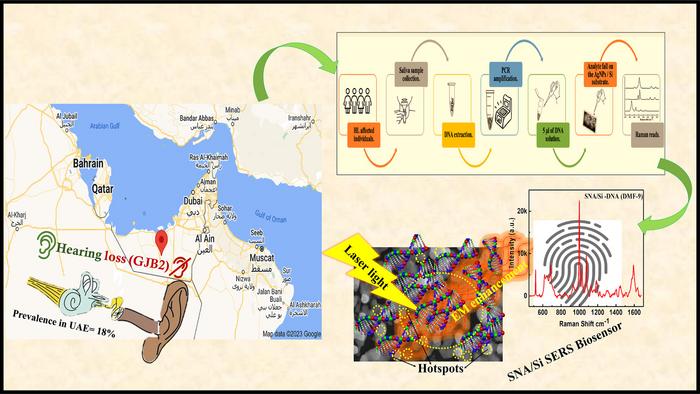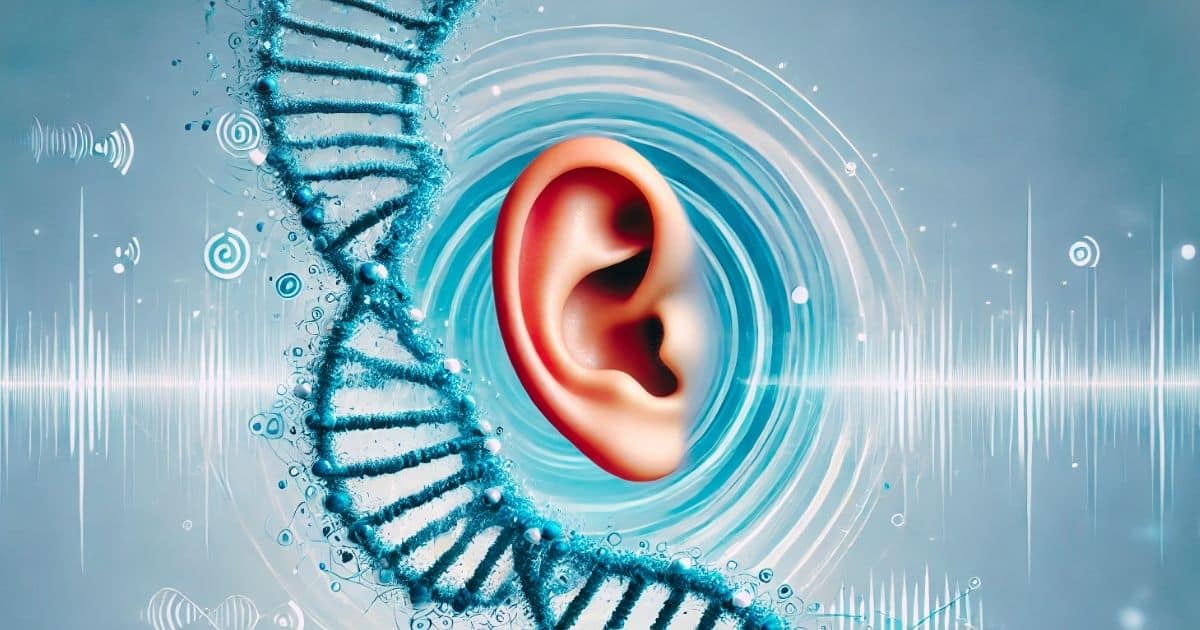A team of scientists from the University of Sharjah has unveiled a groundbreaking biosensor capable of detecting gene mutations responsible for hearing loss. This innovative sensor, composed of nanoparticles and nanoarrays of silver, provides precise and rapid diagnosis not only for hearing loss genes but also for other conditions such as cancer, Alzheimer’s, and thalassemia.
The research, published in the International Journal of Biological Macromolecules, highlights the potential of this biosensor to revolutionize global medical diagnostics. “This innovation may transform global medical diagnostics by integrating SERS biosensors into diagnostic devices, allowing for the screening of numerous infections,” said Mounir Gaidi, Professor of Applied Physics at the University of Sharjah and a co-author of the study.
Advanced Technology for Enhanced Detection
The biosensor utilizes Surface-Enhanced Raman Spectroscopy (SERS), an advanced analytical technique that detects and diagnoses molecules at very low concentrations. The team’s sensor enhances the capabilities of SERS by incorporating a highly efficient, label-free, and ultrafast plasmonic system, which uses silver nanoarrays on silicon (SNA/Si) substrates. This design facilitates the direct detection of deafness mutations in the GJB2 gene, which is associated with non-syndromic hearing loss (NSHL).

Scheme of real time sensing of deafness mutations with SNA/Si SERS biosensor. Image credit: https://doi.org/10.1016/j.ijbiomac.2024.129381
“Our research presents a simple, cost-effective SERS biosensor that can detect deafness-causing gene mutant DNA obtained from the saliva of affected individuals,” said Professor Gaidi. The biosensor’s rapid detection capabilities make it a vital tool for identifying hearing loss genes and predicting other deadly diseases.
Practical Applications and Future Research
The researchers emphasize the stability, sensitivity, and reproducibility of their biosensor, which outperforms existing instruments in diagnosing hearing loss genes.
“The developed biosensor is stable, reproducible in signal detection, label-free, and highly sensitive for low detection levels. Our study aims to create a library of files for deafness mutations to facilitate clinical diagnostics in a simple and rapid approach”
–Prof. Mounir Gaidi
The team acknowledges the challenges in developing rapid biosensors but highlights the significant impact such innovations can have in the medical diagnostic field. “Finding rapid biosensors to sense disease-causing infections is like searching for the grand pursuit in the medical diagnostic field,” said Gaidi. The research aims to establish a foundation for more efficient and widely accessible technologies.
Lead author Arwa Alsafadi aims to create an inventory of data associated with GJB2 gene mutations, which lead to hearing loss conditions. “This research paves the way for the creation of SERS library files associated with GJB2 genetic mutations related to hearing loss, facilitating rapid diagnosis,” Alsafadi stated.

The newly developed Label free silver nanoparticle SERS sensor capable of detecting DNA of GJB2 genes causing hearing loss. image credit: https://doi.org/10.1016/j.ijbiomac.2024.129381
Broader Implications and Future Directions
The innovation has the potential to revolutionize medical diagnostics, according to research assistant Krithikadevi Ramachandran. “Our findings on SERS label-free biosensing to screen individuals with hearing loss associated with GJB2 gene mutations could revolutionize medical diagnostic technology,” Ramachandran said.
The team envisions extensive applications for their biosensor, including the detection of various genetic mutations and integration into portable diagnostic devices. “The potential applications of these fabricated biosensors are extensive, encompassing the detection of mutations associated with deafness and other genetic mutations once functionalized,” said Kais Daoudi, Professor of Physics and co-author.
Co-author and Associate Professor Abdelaziz Tlili highlighted the biosensor’s practical goals, including rapid SERS sensing of viral proteins, DNA, and biomolecules responsible for pandemic outbreaks and infections. The researchers plan further investigations to enhance the efficiency and accessibility of this technology.
“This technology can be applied in diverse sectors such as food inspection and water quality testing to screen for low levels of organic substances,” said Gaidi. The team aims to create a comprehensive library for different types of gene mutations, starting with those causing hearing loss and extending to other health issues, promising rapid and cost-effective diagnostics.
Citation:
- AlSafadi, A. A. I., Ramachandran, K., Columbus, S., Tlili, A., Daoudi, K., & Gaidi, M. (2024). Highly efficient, label free, ultrafast plasmonic SERS biosensor (silver nanoarrays/Si) to detect GJB2 gene expressed deafness mutations in real time validated with PCR studies. International Journal of Biological Macromolecules, 259(Part 2), 129381. https://doi.org/10.1016/j.ijbiomac.2024.129381
Source: Univ. of Sharjah; IJBM






